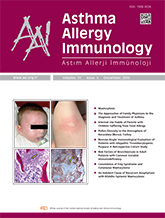


Objective: Common Variable Immunodeficiency (CVID) is a heterogeneous immune disorder characterized by frequent and recurrent upper and lower respiratory tract infections. Although immunoglobulin (Ig) replacement therapy (IgRT) reduces the frequency of infections, complications due to infections of the respiratory tract, particularly bronchiectasis, is still challenging and occur in approximately 20% of patients. Therefore, we aimed to identify independent predictors of bronchiectasis in adult patients with CVID.
Materials and Methods: We retrospectively analyzed the hospital records of 45 CVID patients (26 male, 19 female). Additionally, we classified the patients according to the presence of bronchiectasis. Bronciectasis was confirmed by high resolution computed tomography of thorax.
Results: Forty-five patients with CVID (F:19 [42.2%], M: 26 [57.8%]) were included in the study (age: 36.52 ± 12.86). Bronchiectasis was observed in 60% of the study group. Univariate regression analysis revealed that IgG levels (OR: 4.889, 95% CI, 0.485-0.959, p: 0.012) and IgA levels (OR: 2.559, 95% CI, 0.097-1.235, p: 0.030) at the time of diagnosis and the percentage of switched memory B cells (OR: 0.848, 95% CI, 0.730-0.984, p: 0.030) were significantly associated with bronchiectasis. Multivariate regression analysis showed that a lower percentage of switched memory B cells (OR: 0.853, 95% CI, 0.733-0.991, p: 0.038) and a low platelet count (OR: 1.000, 95% CI, 1.000-1000, p: 0.026) were also independent predictors of bronchiectasis.
Conclusion: Clinicians should be alert for CVID patients with reduced switched memory B cells and low platelet counts in order to detect and treat complications associated with bronchiectasis at an early stage.